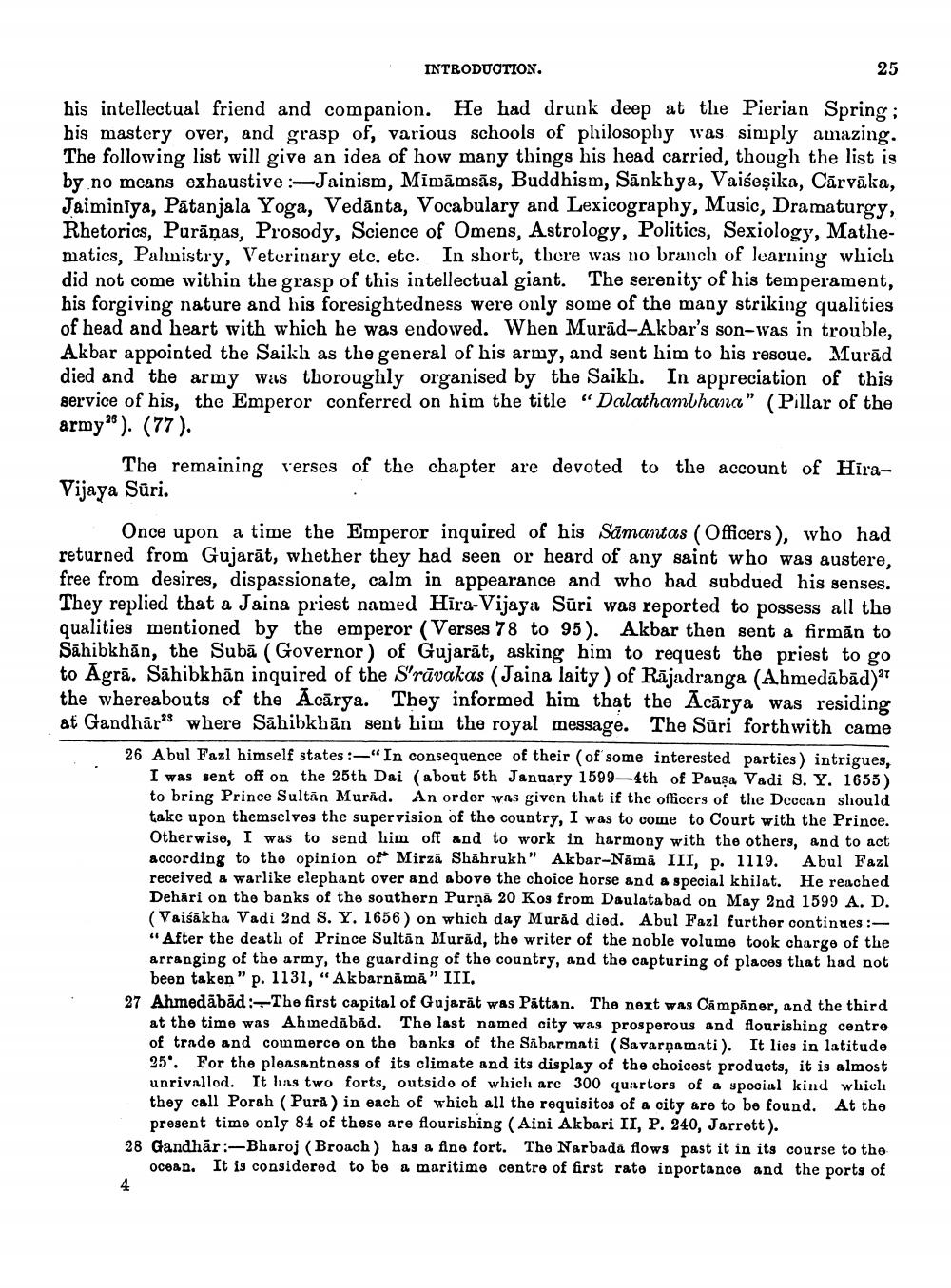________________
INTRODUCTION.
25
his intellectual friend and companion. He had drunk deep at the Pierian Spring; his mastery over, and grasp of, various schools of philosophy was simply amazing. The following list will give an idea of how many things his head carried, though the list is by no means exhaustive Jainism, Mimāmsās, Buddhism, Sankhya, Vaiseşika, Cărvāka, Jaiminiya, Patanjala Yoga, Vedānta, Vocabulary and Lexicography, Music, Dramaturgy, Rhetorics, Purāņas, Prosody, Science of Omens, Astrology, Politics, Sexiology, Mathematics, Palinistry, Veterinary etc, etc. In short, there was no branch of learning which did not come within the grasp of this intellectual giant. The serenity of his temperament, his forgiving nature and his foresightedness were only some of the many striking qualities of head and heart with which he was endowed. When Murād-Akbar's son-was in trouble, Akbar appointed the Saikh as the general of his army, and sent him to his rescue. Murād died and the army was thoroughly organised by the Saikh. In appreciation of this service of his, the Emperor conferred on him the title "Dalathambhana” (Pillar of the armyas). (77).
The remaining verses of the chapter are devoted to the account of HiraVijaya Sūri.
Once upon a time the Emperor inquired of his Sāmantas (Officers), who had returned from Gujarāt, whether they had seen or heard of any saint who was austere, free from desires, dispassionate, calm in appearance and who bad subdued his senses. They replied that a Jaina priest named Hira-Vijaya Sūri was reported to possess all the qualities mentioned by the emperor (Verses 78 to 95). Akbar then sent a firmān to Sāhibkhān, the Subā (Governor) of Gujarāt, asking him to request the priest to go to Agrā. Sāhibkbān inquired of the S'rāvakas (Jaina laity) of Rājadranga (Ahmedābād) ar the whereabouts of the Acārya. They informed him that the Acārya was residing at Gandhāra where Sāhibkbān sent him the royal message. The Sūri forthwith came
26 Abul Fazl himself states :-"In consequence of their (of some interested parties) intrigues,
I was sent off on the 25th Dai (about 5th January 1599—4th of Pauşa Vadi S. Y. 1655) to bring Prince Sultan Murad. An order was given that if the officers of the Deccan should take upon themselves the supervision of the country, I was to come to Court with the Prince. Otherwise, I was to send him off and to work in harmony with the others, and to act according to the opinion of Mirzā Shāhrukh" Akbar-Nämä III, p. 1119. Abul Fazl received a warlike elephant over and above the choice horse and a special khilat. He reached Dehäri on the banks of the southern Purņā 20 Kos from Daulatabad on May 2nd 1599 A. D. (Vaisakha Vadi 2nd S. Y. 1656 ) on which day Murăd died. Abul Fazl further continues :"After the death of Prince Sultan Murăd, the writer of the noble volume took charge of the arranging of the army, the guarding of the country, and the capturing of places that had not
been taken” p. 1131, “Akbarnām." III. 27 Ahmedābād --The first capital of Gujarāt was Pattan. The next was Campāner, and the third
at the time was Ahmedabad. The last named city was prosperous and flourishing centre of trade and commerce on the banks of the Sabarmati (Savarpamati). It lies in latitude 25. For the pleasantness of its climate and its display of the choicest products, it is almost unrivallod. It luns two forts, outsido of which are 300 quartors of a spooiul kind which they call Porah (Pura) in each of which all the requisites of a city are to be found. At the
present time only 8t of these are flourishing (Aini Akbari II, P. 240, Jarrett). 28 Gandhār:-Bharoj (Broach) has a fine fort. The Narbadā flows past it in its course to the
ocean. It is considered to be a maritime centre of first rato inportance and the ports of




